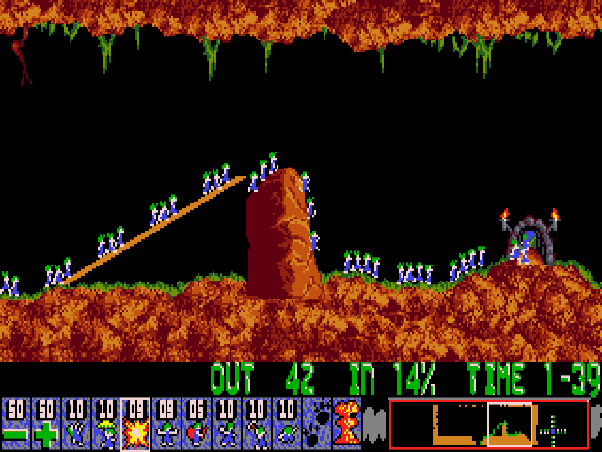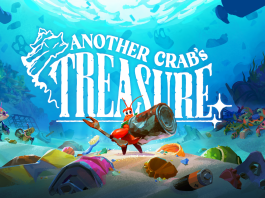“Let’s go!”
“She’ll be coming round the mountain when she comes…”
Ten-year old me had a strange idea of what a lemming was. They were pale-skinned little creatures, with a shock of green hair, blue pyjamas and – most importantly – a determination to tumble off platforms to their doom. As it turned out – and it took me a few years to realise – lemmings are actually cuddly little guinea-pig-looking things, without the green hair, and they tumble off cliffs because they run out of room, thanks to a habit of over-populating. Frankly, the truth isn’t as good as the fiction.

I’d gotten this wrong impression thanks to the Amiga classic Lemmings, released in February of 1991. And what a game it was, putting you in the position of lemming-wrangler, god, or whatever you were. Lemmings would tumble out of a trapdoor in their dozens, and then automatically walk around, most often to their doom. You would assign them jobs by clicking on them, turning them into Blockers (to just keep them still, goddammit), Diggers were used to dig vertically down, Floaters to parachute down, and many, many more. By using your limited number of jobs wisely, you could navigate the lemmings to the door and freedom.
Lemmings was also home to perhaps the greatest game mechanic of all time: the Nuke feature, which would explode all of your lemmings because the level had become uncompletable (or because you were feeling particularly sadistic).
It’s hard to overstate just how different Lemmings felt at the time. It’s no secret that games were rock-hard back then: I could barely count the number of games I had completed on my keyboard-weathered fingers. But they were most often hard in a variety of unfair ways, limiting your lives, or tossing a ridiculous number of enemies at you, because game designers didn’t have the ability or tools to tweak things like AI. You didn’t complete most games: you simply beat another person’s score, or got further than they did.

In Lemmings, suddenly I found myself pitted against something that was difficult, but in a problem-solving sense. There were answers, and those answers were within my grasp, if I could only wrap my head around the right permutation of ‘jobs’, and which lemming to use them on. The closest I had come to pitting my wits against a computer game was Battle Chess, but that felt like playing a robot. In Lemmings, I felt like I was being challenged by the game designers.
As it turns out, there was a fantastic spirit of competition behind the scenes at DMA Design and Psygnosis. Designers would challenge each other to beat their levels, and the most fiendish made it into the final cut. An external team would QA their levels, and solutions would come back as faxes, with scribbles annotating the best path to the exit. Just as DMA designers were trying to unravel each others’ puzzles, ten-year old me was trying to unravel them too.
This all implies that Lemmings was fiendish, but I believe it’s one of the best examples of a difficulty curve in gaming. It’s one of my go-to examples, alongside Plants vs. Zombies and Super Mario Bros.: each level is incrementally more difficult than the last, with a new job being introduced periodically, and the number of jobs per level increasing slightly too. Lemmings superbly guided you through a concept that could have been overwhelming.
It’s easy to forget how revelatory this concept was too. It’s only through researching this article that I’ve realised that Lemmings preceded games like Command & Conquer, Warcraft, Dune II and other real-time strategy games. Lemmings gave you automated NPCs and then offered you indirect control over them, allowing you to assign commands when you desired them to do something else. Blizzard Entertainment developer Bob Fitch has gone on record to say that Lemmings was a huge influence, as the indirect control scheme gave them the idea of a continuous flow of troops, controlled through occasional commands. Helping to birth the RTS genre is an impressive legacy.

When I think of Lemmings, I also think about the many ridiculous consoles and computers I played it on. I remember owning a port of the game on the Nintendo Gameboy, which was a wild waste of pocket money. There was no way that this fiddly little puzzler, requiring real precision, would ever have worked on the portable little green goblin, and so it proved. I don’t think I’ve squinted so much in my life, and it soon got yanked out of the slot and replaced by Tetris. I had a surprisingly decent version on the Atari Lynx, and an anachronistic version on the PS1, where the sad realisation hit that Lemmings was starting to feel old.
Lemmings hasn’t survived in the same manner as many of its peers. I think primarily of Worms, which has lived a longer and fuller life. Perhaps it’s the perfection of the original Lemmings, which doesn’t give much wiggle-room for improvement. Perhaps it’s the lack of multiplayer and party appeal, which left it too firmly in the single player camp. Or perhaps it’s the commitment it demands from the player, expecting nothing less than high levels of precision, brainpower and timing.
Regardless, for a period of a few years, Lemmings burned brightly. In 1991 alone, we got Lemmings, Oh No! More Lemmings, and Lemmings: The Christmas Levels, and the game was ported to systems that have long-since escaped people’s memories (bless you, CDi and CDTV), along with a 2013 Windows 8 version for PC which is still available from the Microsoft Store. It sold 20 million copies, and remains a favourite for fuddy-duddies like me, who will tell you that ‘they don’t make them like this anymore’, and ‘Starcraft wouldn’t exist if it weren’t for Lemmings’.
Just nod and shuffle us along to the exit. I think I’ve got some blue pyjamas somewhere.







